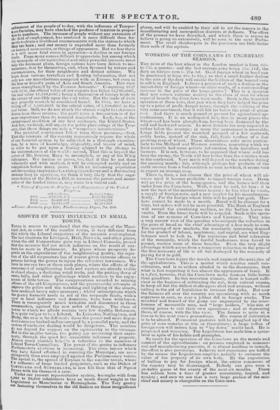GROWTH OF TORY INFLUENCE IN SMALL TOWNS.
THERE is reason to apprehend that the operation of the Muni- cipal Act, in some of the smaller towns, is very different from that which the Liberal supporters of the measure contemplated. The last elections for Liverpool, Hull, Norwich, and other places, where the old Corporations gave way to Liberal Councils, proved that the measure had not much influence on the result of con- tests for seats in Parliament. In places whose prosperity de- peals on the expenditure of the neighbouring gentry, the rejec- tion of the ohl curporatore has of course given extreme uffence to persons having the power to injure the refractory townsmen. We have in our eye two or three such places, where the effects of the resentment of neighbouring lords and squires are already visible in closed shops, a declining retail trade, and the putting down of races, balls, and other gatherings which conduce to the enjoy- ments of little towns. The compensations awarded to retiring officers of the old Corporations, and the praiseworthy attempts ut improve the police and the watching and lighting of the streets, have rendered heavy rates necessary ; whilst subscriptions which the gentry formerly made in aid of the corporate funds, with a view to local influence and dominion, have been withdrawn. There is consequently much irritation and discontent in those communities, against the new order of things. The class of towns to which we allude contain very few wealthy Reformers. It is quite vulgar to be a Liberal. In Leicester, Nottingham, and Derby, the ease is far &llama: there the poorer and more depen- dent voters me backed and encouraged by a powerful party, awl the system of exclusive dealing would be dangerous. The retailers do not depend for support on the squirearchy in the vicinage. But in the smaller towns, the gentry are recovering their supre- Duey, through the quiet but irresistible influence of property. Almost every election beholle a reduction in the numbers of Liberal Town-Councillors. The power of the gentry to influence Parliamentary elections is inereasing. 'The same means which they have found effectual in coercing the Municipal, are more stringently than ever employed against the Parliamentary Vetere. The upshot is, the spread of Toryism in the smaller towns, where fie influence of large landed proprietors, such as the Dukes of CLEVELAND and SUTHERLAND, is lees felt than that of Spite Ions with his thousand a year. Under our present representative system, boroughs with from 6,000 to 20,000 inhabitants have as much direct weight in the Legislature as Manchester or Birmingham. The Tory gentry are fastening themselves in the old fashion on these insignificant places. and will be enabled by their aid to set the masses in the manufacturing and metropolitan districts at defiance. The effect of the process we have described, and which there is reason to believe is going on extensively, will be seen in the next Parlia- ment. The retail shopkeepers in the provinces are little better than serfs of the squires.


























 Previous page
Previous page